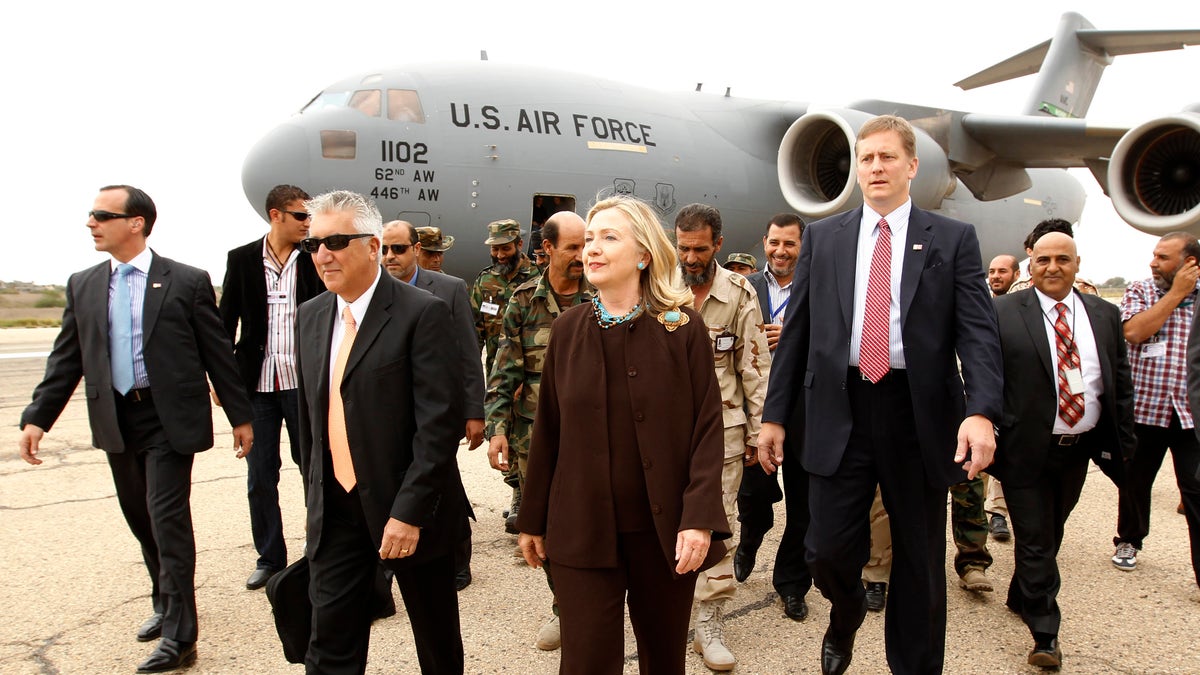
October 18: U.S. Secretary of State Hillary Rodham Clinton walks from her C-17 military transport upon her arrival in Tripoli Libya. (AP)
TRIPOLI, Libya – The Obama administration on Tuesday increased U.S. support for Libya's new leaders as Secretary of State Hillary Rodham Clinton made an unannounced visit to Tripoli and pledged millions of dollars in new aid, including medical care for wounded fighters and additional assistance to secure weaponry that many fear could fall into the hands of terrorists.
U.S. officials said the fresh aid Clinton is bringing totals about $11 million and will boost Washington's contribution to Libya since the uprising against Muammar Qaddafi began in February to roughly $135 million. The officials told reporters traveling with Clinton that it is evidence of the administration's commitment to working with the National Transitional Council as it consolidates control over the entire country and moves to hold free and fair elections.
As part of the new aid package, the U.S. will re-launch several educational programs, including Fulbright scholarships and English language training, and help fund an archeological project that will survey eastern Libya, the officials said. In addition, they said Clinton will be stressing the importance of good governance, inclusion, democratization and diversifying Libya's economy so it no longer is almost entirely dependent on oil revenue.
Officials said Clinton would also raise the case of the Lockerbie bombing with Libyan officials. Last month, Scotland asked Libya's new authorities to help track down those responsible for the 1988 bombing of Pan Am Flight 103 over the Scottish town. It killed 270 people, most of them American.
The only person charged with the bombing -- former Libyan intelligence officer Abdel Baset al-Megrahi -- was freed on compassionate grounds in 2009 because of illness. His release infuriated the families of many Lockerbie victims.
The U.S. officials spoke on condition of anonymity ahead of Clinton's public events in Tripoli, which also were to include meetings with civic leaders that have been kept secret for security reasons.
Most of the new money will go toward finding and destroying thousands of Qaddafi-era shoulder-fired surface-to-air missiles that are unaccounted for since the fighting began. Clinton and other senior U.S. officials have repeatedly stressed the importance of dealing with stockpiles of Libyan weapons.
The State Department already has sent 14 weapons experts to Libya and is looking for other countries to contribute to the effort. The new U.S. contribution of some $10 million means Washington will have spent $40 million on the effort alone since the former rebels began making major military progress, according to the officials.
The dollar amount of the medical portion of the new assistance is not yet known but will go to a multi pronged program to assist former rebel troops badly wounded in fighting with Qaddafi loyalists, the officials said. There have been about 15,000 wounded during the conflict so far, about 1,500 of whom are now amputees and require specialized care that is not available in Libya.
The medical portion will include transportation to treatment for the most seriously wounded, spare medical parts to fix equipment for trauma care, and chemicals needed to run and drive equipment, the officials said. It also will go to establish a patient tracking program.
Clinton is the most senior American official to visit Libya since the uprising against Qaddafi began in February and only the second secretary of state to visit in the past 50 years. The last secretary of state to visit was Condoleezza Rice, who traveled to Tripoli in 2008 and met with Qaddafi after relations between the U.S. and Libya were restored.
Clinton is the latest in a string of senior Western dignitaries to visit Libya in recent weeks -- British Foreign Secretary William Hague was there Monday -- and her arrival came as Libyan officials said they had captured almost all of Bani Walid, one of Qaddafi's last remaining strongholds, but still face pockets of resistance as they try to end a weeks long standoff. About 1,000 Libyan revolutionary troops launched a major assault on Qaddafi's hometown of Sirte on Tuesday, surging from the east to try to capture the last area under loyalist control.
Fierce resistance in Bani Walid and Sirte has prevented Libya's new leaders from declaring full victory and setting a timeline for elections. It has been more than two months since the former rebels gained control of Tripoli and the rest of the oil-rich North African nation.
